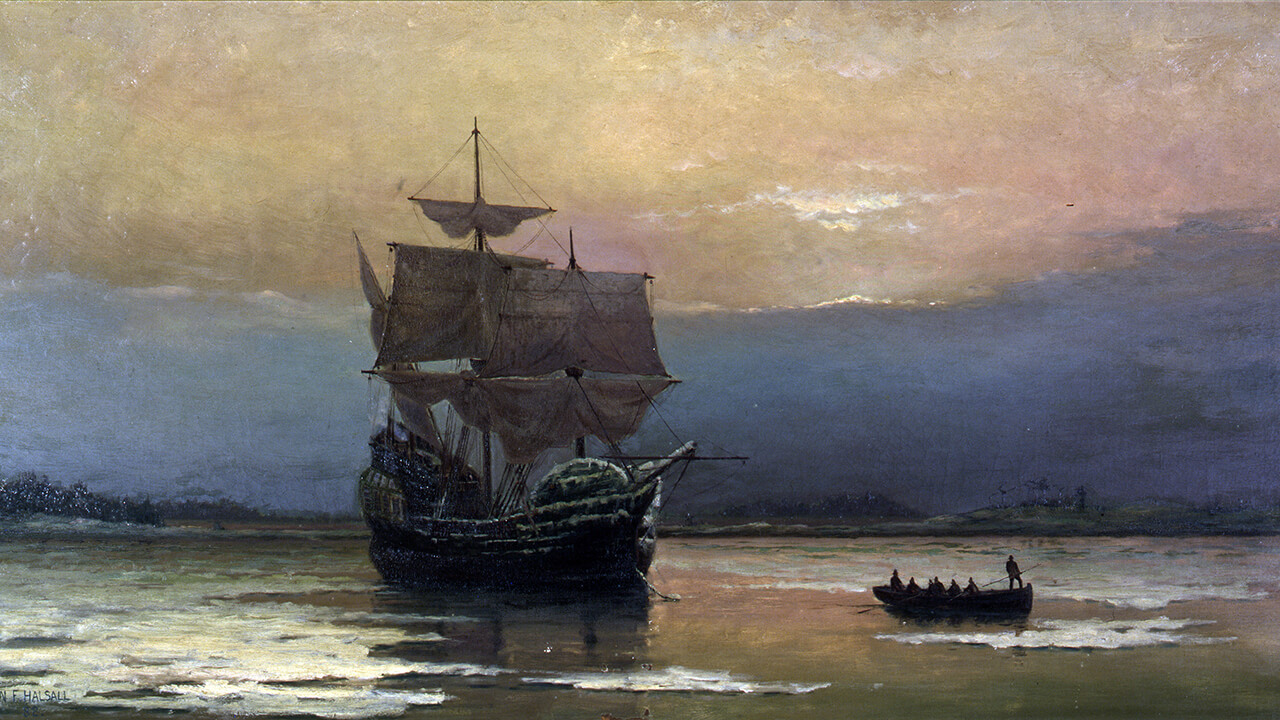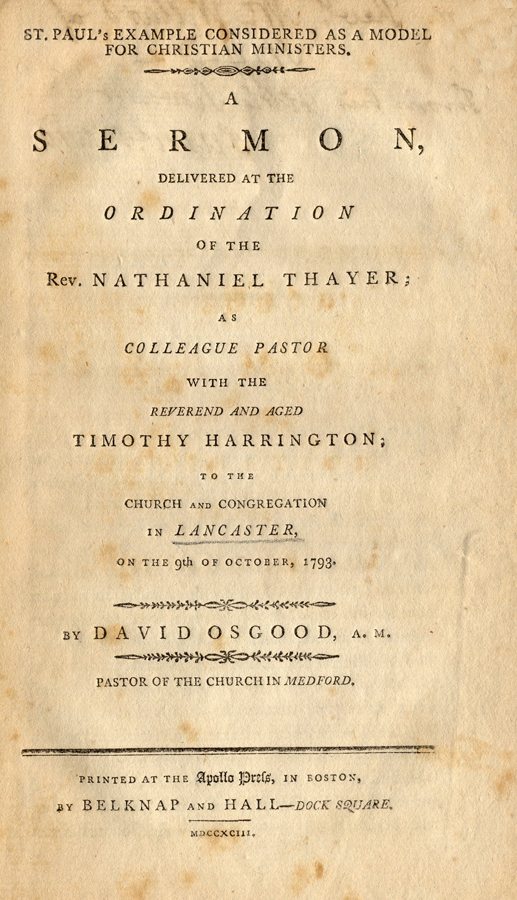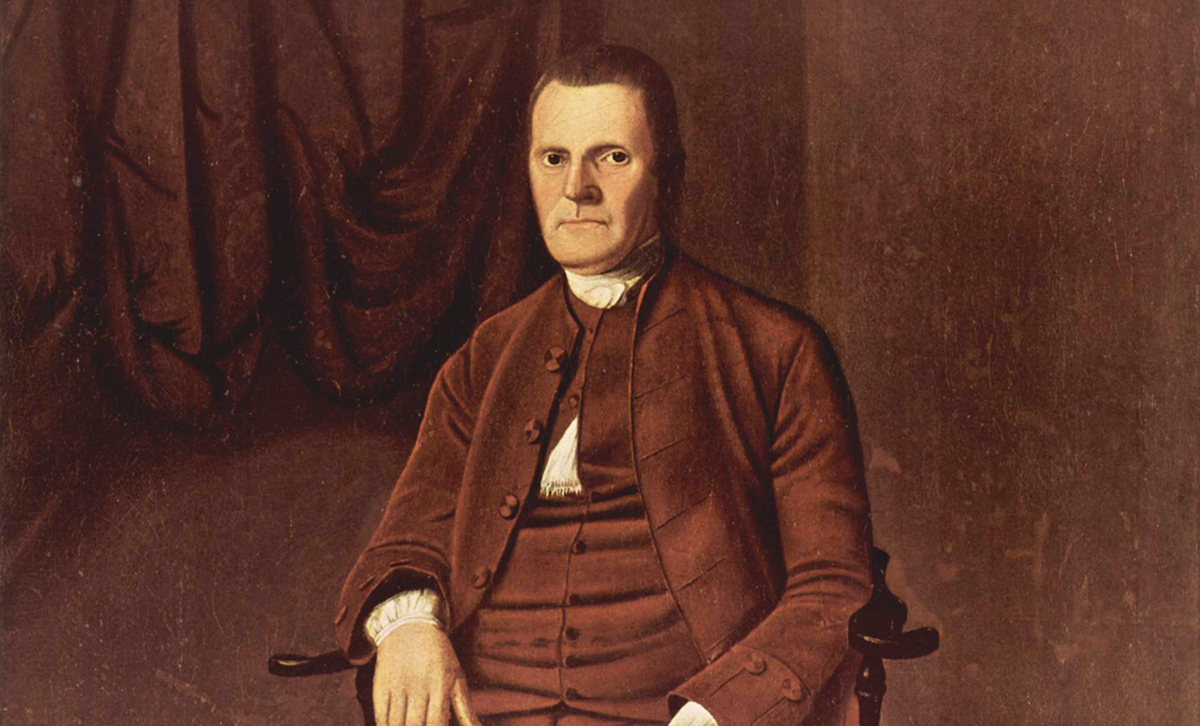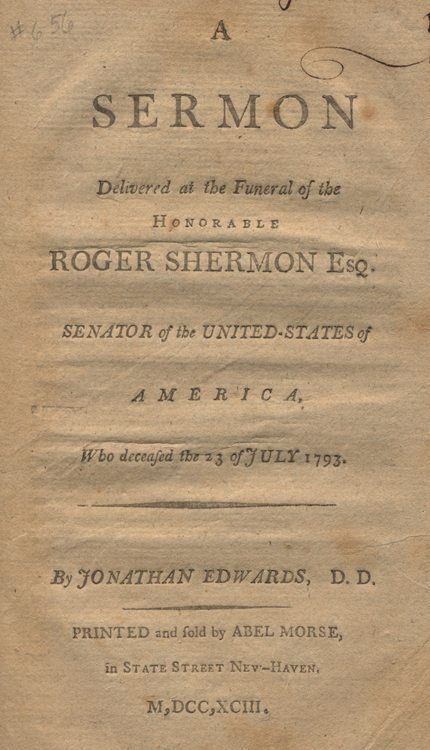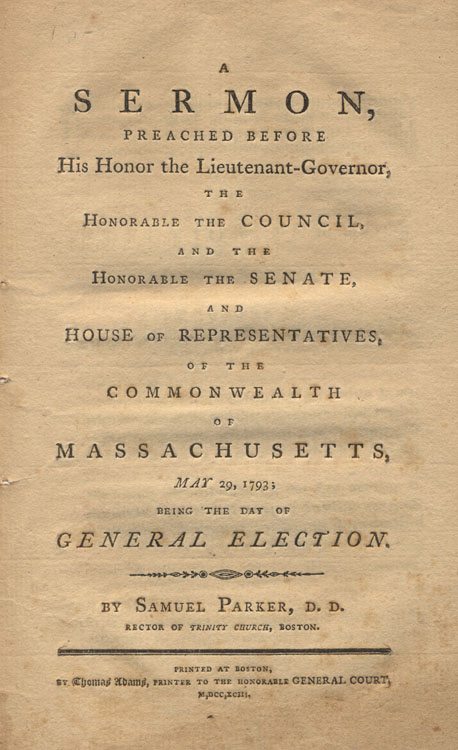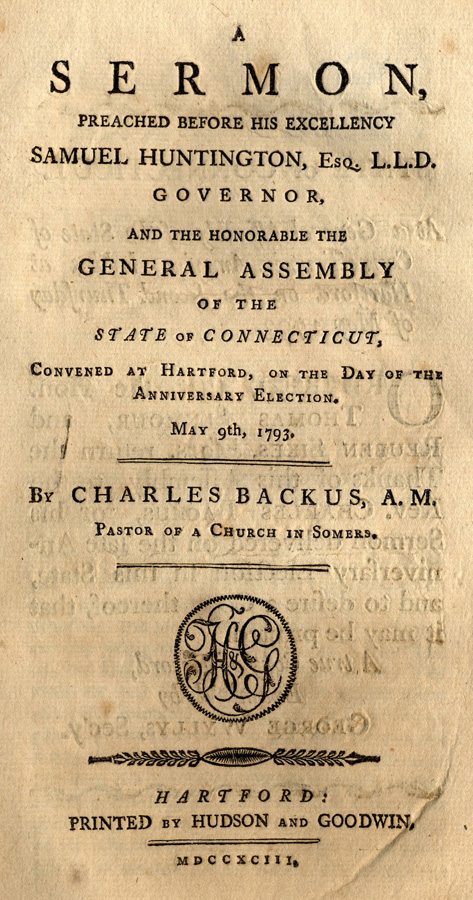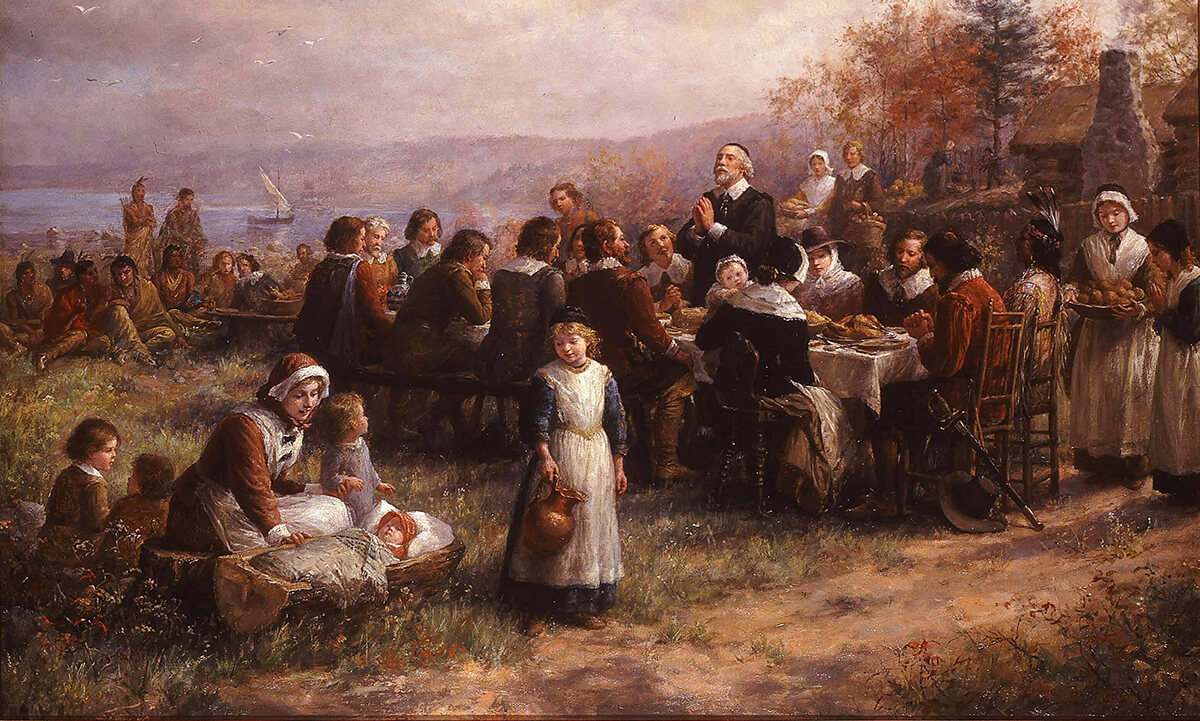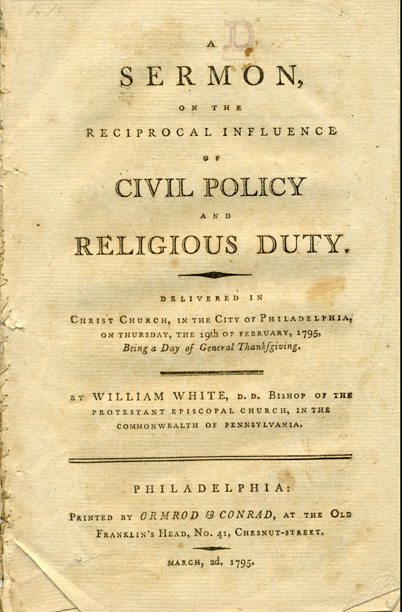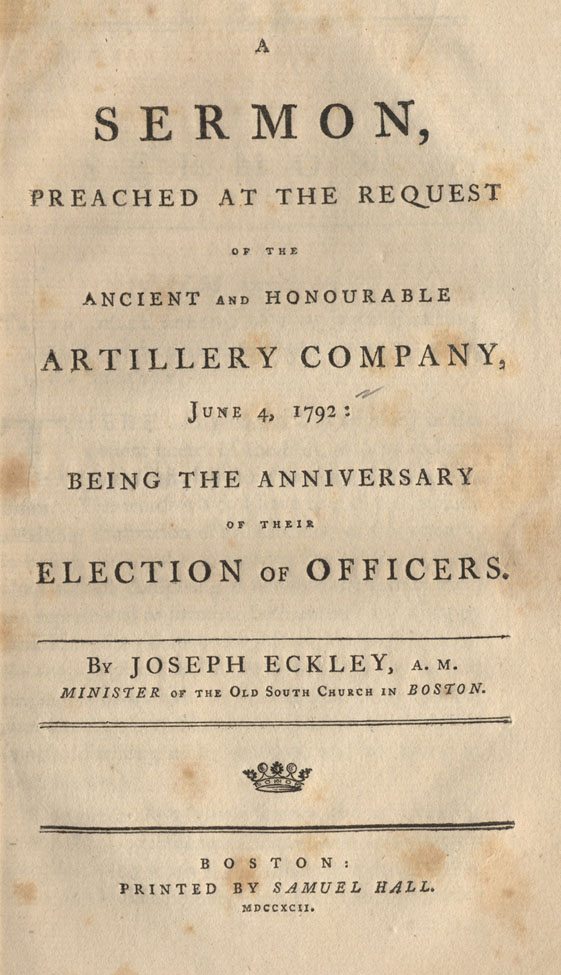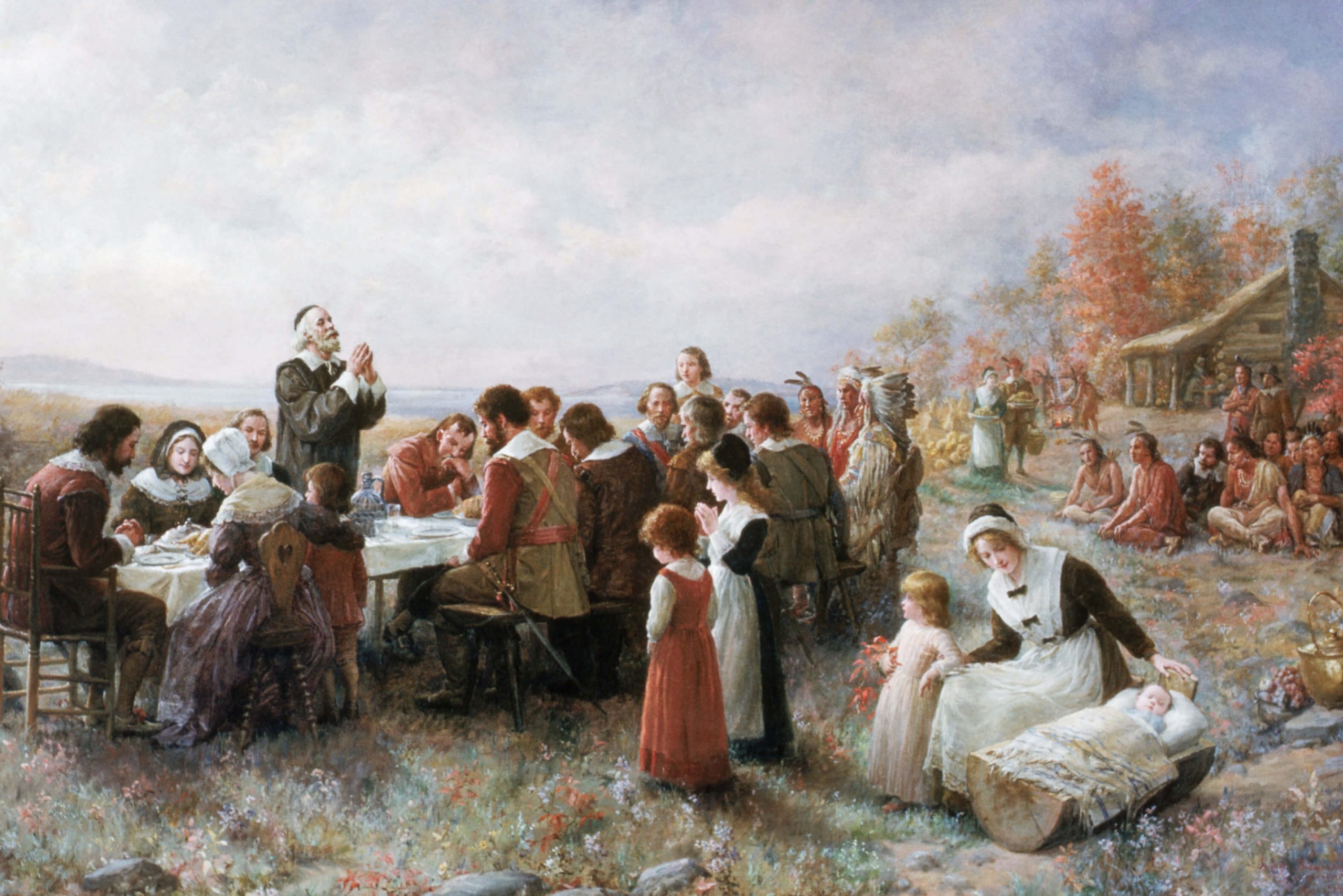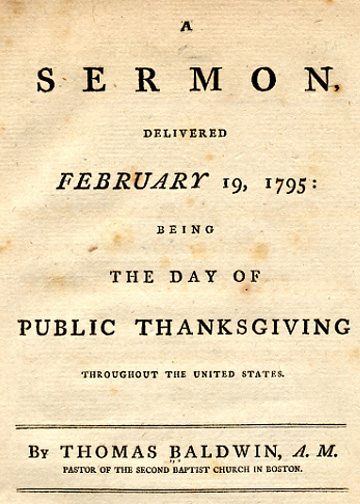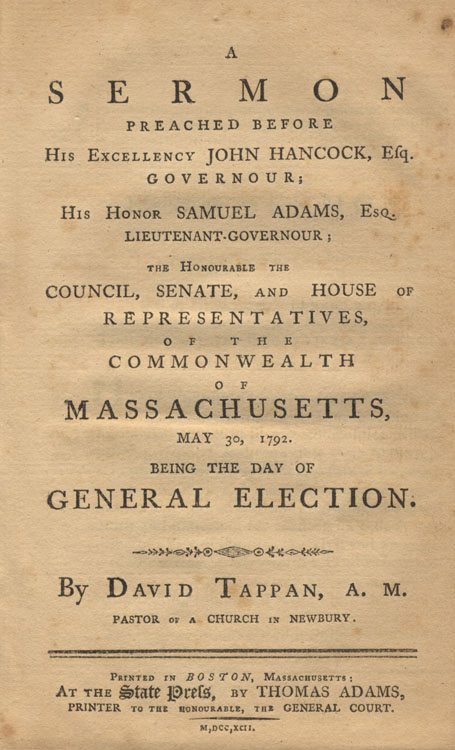Chandler Robbins was born in Branford, Connecticut in 1738, and he graduated from Yale in 1756. He studied theology and was ordained pastor of the Congregational church in Plymouth, Massachusetts.
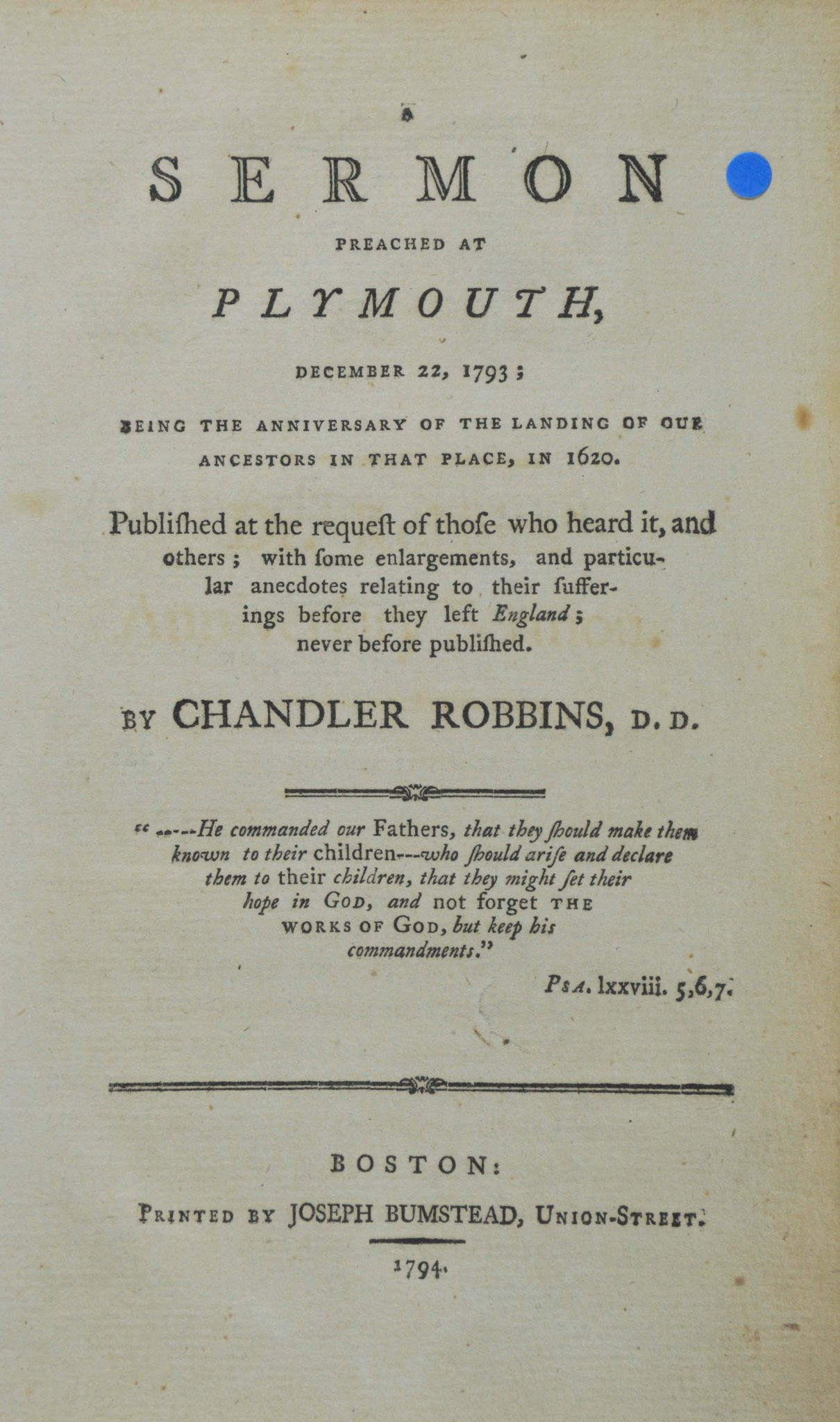
SERMON
PREACHED AT
PLYMOUTH,
DECEMBER 22, 1793;
BEING THE ANNIVERSARY OF THE LANDING OF OUR ANCESTORS IN THAT PLACE, IN 1620.
Published at the request of those who heard it, and others; with some enlargements, and particular anecdotes relating to their sufferings before they left England; never before published.
BY CHANDLER ROBBINS, D. D.
“…..He commanded our Fathers, that they should make them known to their children—who should arise and declare them to their children, that they might set their hope in God, and not forget the works of God, but keep his commandments.”
Psa. Lxxviii. 5, 6, 7.
Printed by JOSEPH BUMSTEAD, Union-Street.
1794.
AN
ANNIVERSARY SERMON.
PSALM lxxvii. II
I will remember the works of the Lord; surely I will remember thy wonders of old.
To contemplate the being and the works of god, is an employment at once the most noble, the most satisfying and delightful, that can possibly engage the minds of intelligent creatures. Indeed this is the great end of their being. This is the employment of angels, and of all the heavenly hosts. Their distinguished powers, are constantly engaged in “looking into,” and admiring “the manifold wisdom,” order the beauty, which shine with peculiar glory in the works of their Maker. And after all the discoveries they have made, still new, and increasing wonders arise, which add fresh ardor to their desires, and growing delight and happiness to their minds. And thus it will continue to be, to all eternity.—And the nearer we resemble these heavenly intelligences, the greater pleasure shall we take in viewing and contemplating these objects: until, lost in wonder, we shall be ready to exclaim, “Great and marvelous are thy works, Lord God Almighty, just and true are thy ways, thou King of saints!”
That which principally engages the pious mind in this delightful employment, is, that in the discovery of the glory of the divine character, displayed in his works, he is led to more high and exalted ideas of the blessed God, and is thence excited to praise and adore him, to love and trust in him as the alone SUPREME Good—the only soul-satisfying Object, “in whom is all his salvation and all his desire.”
It was on this ground, the Psalmist uttered the pious resolution in the text, “I will remember he works of the Lord—surely I will remember thy wonders of old.” No object afforded him so much delight—no hours were so agreeably employed, as those spent in mediating upon, and recalling to his mind, the great things God had done for the children of men; and particularly, the mighty acts of his power and grace, in favour of his ancient chosen people, in times of old.—He refers here, doubtless, to the wonders which were wrought by the almighty hand, in the emancipation of Israel from their cruel bondage in Egypt, and the great salvation they experienced afterwards.
The passage before us would lead us into a wide and delightful field for serious and useful meditation. But the time allotted me, and the present season, will only permit me to consider some of them, which I shall endeavor, under this general Doctrine—
That it is a duty incumbent on ALL, and it will be the delight of the truly pious mind, frequently to recollect the works of God, and to acknowledge with gratitude his ancient WONDERS to our FATHERS.
Since, by the providence of God, my brethren, this day falls out on the anniversary of the landing of our FOREFATHERS in this place, this subject seems well calculated to afford us some agreeable and profitable improvement of that great and astonishing event—an event, which has been followed with such great and important consequences to this land; which has laid the foundation of this NEW WORLD; and all those surprising scenes which have already taken place in it—as well as those still greater ones which are now in action, and others which will succeed them, to the end of time.
We who are now on the stage, have seen so much in our day, that, it is hoped, we shall never forget “the works of the Lord;” besides those ancient “wonders” which “we have heard with our ears, and of which our fathers have told us.”
It will be proper for us to consider
I. First, what these works of the Lord are, which we should remember.
II. What is implied in the remembrance of them.
III. The benefits which result from a due remembrance of the works of the Lord.
I. We are first to consider what those works of the Lord are, which demand our devout recollection.
The WORKS of God are great and manifold, and none of them are to be forgotten, or excluded from pious observance. For “ALL his works praise him.” They are all wonderful, and loudly proclaim the glory of their divine Author.—But when we speak of the works of the Lord, they are usually distributed under these three heads—the work of creation—the works of providence—and his works of grace. All these bear the most evident and glorious signatures of God.
The work of CREATION exhibits such a display of the divine perfections of its Author, as demands the most explicit acknowledgement and praise of all rational intelligences. How astonishing must be the power of that Being, who, by a single act of his will, could cause this glorious fabric of the UNIVERSE, in a moment, to spring from nothing into existence; and in such beautiful order, grandeur and harmony! How striking and how solemn are those words, God said, “Let there be light, and there was light!” “He spake and it was done—he commanded, and it stood fast.” How is the serious, reflecting mind struck with amazement, likewise, at the vast number, and almost infinite variety of created existences, in every part of the universe! “The heavens” above us, with all their shining train, “declare” in the most expressive language, “the glory of their Creator.” “The firmament sheweth his handy work.” Wherever we turn our eyes, divine power, wisdom and goodness meet them. All creatures, animate and inanimate are full of glowing evidences of Deity. Our own bodies—“how fearfully and wonderfully are they made!” Our immortal souls bear a still nearer resemblance to, and more clearly display the wisdom and glory of their great Original.—Thus, by the work of creation, and “by the things that are made, are to be seen and understood his ETERNAL POWER and Godhead.”
The works of PROVIDENCE are no less remarkable, than those of creation. Indeed, so necessary is a DIVINE power for the preservation of the world in existence and order, that this has been, and not improperly, called a continued act of creation. None but the same omnipotent hand, which made the world, and could uphold it, a moment, in being. The constant preservation of created existence, is therefore, as strong an argument for the being of a God, as the first production of them from nothing. It is as much “in HIM” and from him, that “we live and move,” as that we “have our being.”—But the providence of God, is not only concerned in upholding creation, and continuing all things in being, but in the special ordering and directing all creatures and things, so as to answer the great and wise ends for which they were made. And this extends to all things in the moral, as well as the natural world: and comprehends all events which take place in both. Accordingly God is said to “work all things according to the counsel of his will.” And that he hath not only “the sparrow,” and the hairs of our heads, and all material things, but even “the hearts of all in his hand, and turneth them whithersoever he pleaseth, as the rivers of water are turned.” And that he “worketh in men, both to will and to do, of his own good pleasure.
David justly received it as a most joyful consideration (and so do all good men) that every thing was under God’s direction and controul. That all creatures and all events were entirely and absolutely at his disposal. “The Lord reineth, let the earth rejoice.” The government of the universe is in safe hands, because in the hands of a Being who is infinitely just and wise—who cannot err, and who will direct all to the best ends possible. “The Judge of all the earth will do right”—however dark many things in providence, may now appear to us. For he is as wise as he is powerful, and as good as he is wise.
In considering this part of the subject, he works of providence, a very large field opens to our view; in which, it is my purpose principally to walk, at this time; and to endeavor to aid our mutual contemplations, on so pleasing a theme. And I have no doubt, that before we shall have finished our mental walk, we shall see what abundant reason we have, to unite with the Psalmist in the text, and say, “we will remember the works of the Lord; surely we will remember his wonders of old.”
If the divine PROVIDENCE extend to the smallest, and most minute events, as we have heard; how much more to those great revolutions and those important affairs, which have, and which are continually, taking place in the world, in all ages: and especially to those which more immediately respect MAN, as the subject of moral government. But we will pursue this path a little further.—
In “remembering the works of the Lord,” in the government of providence, our minds are carried back to the commencement of ages—to the earliest dawn of time. For no sooner had JEHOVAH spoke creation into existence, but he began to exhibit his own glorious character on its theatre; and to give the most clear evidences of his wisdom, goodness and power, in his conduct towards his new world; and particularly, his noble creature MAN—the brightest image of himself, among all the creatures of this lower world. Here we are led to take a view of the original covenant, which God made with the first father of our race—His holy and happy condition, at his first formation—the delightful situation assigned him in the garden of paradise—and the more delightful communion he enjoyed with his Maker, God—in full possession of his love, and of all the joys of innocence—a stranger to want and sorrow, because a stranger to sin.
But, alas! From this pleasing scene, this state of primitive happiness and moral rectitude, we are led, by the history of providence, soon to behold a melancholy reverse of things—in that awful catastrophe, presented to us, in the guilty apostacy of man from his God, by a transgression of his law.—Thence to the deplorable state of the whole human race, in consequence of his sin—the death and ruin which have overwhelmed the world, “by one man’s disobedience,” by which, “many were made sinners.”
But in the midst of this scene of darkness, and woe, we are led to behold he first beam of hope, which shone upon this ruined world, in the gracious promise of a SAVIOUR, under the character of “the seed of the woman.”—In further looking into the records of providence, we are carried on to view the sad effects of the apostacy of man, in the dreadful destruction of the old world, by a universal flood of water, for their daring wickedness, and their awful defection from God.—After this, to the divine kindness to NOAH, in preserving him and his household from the common desolation, by means of an ark; precious emblem of that glorious sanctuary—that ark of safety, Jesus Christ—the only “hiding-place” for guilty sinners, from a more terrible flood of divine indignation, coming upon all the finally impenitent.—Thence we are led to see the exemplary vengeance which fell on the devoted cities of Sodom and Gomorrah, which were “turned into ashes, and condemned with an “overthrow, for an example to those, who, after, should live ungodly.”—With pleasing wonder, we then contemplate God’s gracious calling of Abraham, and his distinguished regard to this Father of the faithful, and to his seed after him—The miraculous preservation of Moses; and his call and commission to be the messenger of God’s mercy to his afflicted people, and the instrument of their deliverance from bondage.—Thence we come to the amazing story of the hardened monarch of Egypt who “knew not the Lord, nor would he” though at Heaven’s order, “let Israel go:” And whose signal obduracy would not be overcome by all the plagues of Egypt.—From thence to the final rescue of the armies of Israel, from his oppressive hands—The institution of the Passover, an instructive rite, to be observed in grateful commemoration of their deliverance—Their distress, soon after at the Red sea—Their miraculous escape from their enraged enemies—the song of praise, they then sung, and their seeming gratitude to their God, for this signal salvation—but—their speedy revolt, and awful “murmuring against the Lord and his servant Moses.”—The anger of God against their ingratitude, and yet his astonishing patience towards them, under all their rebellion—Their long wanderings a 40 years journey, in the wilderness—where thousands of their carcases fell, for their unbelief—Their safe arrival at last, and their happy settlement in the land of Canaan, the Lord “driving out, by little and little, the Heathen nations, and thus fulfilling his promise made 400 years before, to Abraham their FOREFATHER.—
These, which I have but briefly hinted at, are some of those “works of the Lord” which belong to his providential government of men—and these are “the wonders of old,” which ought to be remembered with devout acknowledgment and praise to God.
But besides these, the Lord, “whose hand is not shortened,” hath wrought great and marvelous works in PROVIDENCE towards other nations and people; and that, in every successive generation, down to the present eventful period. And we may justly view, as none of the least of these, the great and astonishing events, which have taken place in our own land, within eighteen years past—and which have been attended with consequences, so important not only to this country, but to others, and most probably, will be in the event, to all the nations of the world. To the revolution in America, as a mean, in the hand of providence, may probably, be ascribed, the surprising scenes which are acting on the European Continent at the present day; where “the nations, like a “potters vessel, are dashing to pieces,” one against another. The present period appears to be big with as important events, as ever the world has witnessed, as it respects the political state of mankind; and I believe, ultimately, the moral state too.—The grand contest between freedom and tyranny—liberty and slavery, is carried on with amazing ardour—with the most obstinate resolution. And the event must be, soon, either glorious or dreadful.—But it is a sweet and quieting consolation to the friends of religion, that the “the Lord God omnipotent reigns”—that events are entirely in his hands—That he sitteth upon the circle of the earth, and the inhabitants thereof are as grasshoppers—that he bringeth the PRINCES to nothing, he maketh the Judges of the earth as vanity. And it is a matter of unspeakable thankfulness and satisfaction that God is the unalterable friend of righteousness, and “abhorreth the oppressor and evil doer.” And that, “wherein any deal proudly, the Lord is above them.”
It was observed just now, that these great revolutions in providence, will, most likely, produce great changes in the moral as well as political state of the world.—It seems to have been, for a number of years past, my brethren, the evident design of Heaven, by these convulsions and overturnings in the world, to bring on, or at least, to prepare the way for ushering in those glorious and important events, which are so frequently foretold in scripture, respecting the advancement of the cause of truth and righteousness—the more universal spread of the gospel, and the enlargement of the kingdom of our divine Redeemer on earth—when “the kingdom of this world shall be given to Christ—and all the ends of the earth shall see and rejoice in his salvation.—And when the Lord shall build up Zion, he will appear in his Glory.”—
But to return—among other various “works of the Lord” in providence, let us, on this occasion, more particularly look into the history of our own country, and this day call to “remembrance, those wonders of old” which the Lord wrought for our pious progenitors, whose bodies lie mingled with the dust, in THIS PLACE, where we heir children dwell—but whose souls, have long time no doubt been at rest with God.
As, in the first discovery of America, the hand of God was most visibly seen, and ought forever to be remembered with gratitude—so, it has evidently been the object of the peculiar care of Heaven, through every successive period of time, to the present day. It seems to have been, from the beginning, a remarkable Theatre of great and astonishing “works of the Lord.” Our history, from the first landing of our FATHERS in this town, has been a history of wonders; and will furnish, to every generation, perhaps, as much matter for pious reflection and gratitude, as that of any nation or people that ever existed on earth. That of the children of Israel seems the nearest to resemble it: as any one may observe, who is acquainted with them both.
I propose here, agreeably to the words of our text, to give a brief narration of some of “the wonderful works of God, towards our ancestors, which we, their posterity, ought to remember,” and which, it is peculiarly proper, we should call to mind, on this anniversary. In doing this, although the accounts chiefly must be derived necessarily from historical facts, the substance of which some of you, perhaps, may have been already acquainted with—yet, I shall bring to your view, some circumstances—some ancient anecdotes, which, I presume, have never yet been made public, at least, which I have never seen. I shall take them from the first book of the very ancient records of this church, now in my hands. And I hope some useful entertainment, may be afforded at least to the rising generation among us; and on the present occasion, it will not be improper to have the minds of all, even of those who “once knew them, to be stirred up by way of remembrance.”
I would begin, by observing to you, that the moving cause of our fathers leaving England, their native land, and transplanting themselves, finally, in these then “dark corners of the earth,” was, the cruel persecution and religious oppression, they met with in their own land: originating in a spirit of intolerance which then prevailed, especially in the Episcopal hierarchy; a spirit, now abhorred, as much by the enlightened and pious members of that communion, as perhaps by any others whatever; and which is viewed as a miserable relick of ancient popish superstition and bigotry. Our fathers were not indulged the reasonable liberty of worshipping their God agreeably to their own consciences. And though they made no disturbance in the State, but were peaceable members of society, yet because they could not, in conscience, submit to unscriptural impositions, nor bow their necks to the yoke of human inventions, they were loaded with heavy fines and forfeitures—nay, hunted about like “partridges on the mountains,” and persecuted as pests to society. And merely for exercising that Christian liberty, which Christ hath given them, they were seized and many of them imprisoned—others had their houses beset, and watched night and day, and with difficulty escaped their hands; and most of them were obliged to fly and leave their habitations, and all means of subsistence.
Under these burdens they groaned for a considerable time, but still continued, as they had done, to meet as often as they could for the worship of God, (though privately for fear of their enemies) under the pastoral care of that famous and learned divine, Mr. John Robinson, the FIRST Pastor of this ANCIENT CHURCH: until at length, their burdens became intolerable; and they, by joint consent, resole to fly their natie country, and seek an asylum in Holland, where they had heard, was a general toleration given to all denominations of Christians; and where some of their own countrymen had gone before, under like troubles. The undertaking, they knew, was hazardous, and likely to be attended with great expence and difficulty. For their enemies watched them continually, and would do every thing in their power to prevent their escape. What a dreadful situation! They can neither be suffered to lie at home, in peace, nor to go abroad for it. The ports and harbours are watched: strict orders given by authority, not to suffer them to escape. They are obliged to use the most private methods possible, and give extravagant fees to the sailors—and yet were often betrayed by them. Twice hey attempted to remove, and though with the utmost possible privacy, yet they were discovered before they could get away.—One instance of this, I find, which is very affecting, and which I shall here mention, in the words of the records.
“There was a large companie of them purposed to gett passage at Boston in Lincolnshire,, for Holland; and for that end, had hiered a ship wholly to themselves, and made agreement with the master, to be ready att a certaine day, and take them and theire goods in at a convenient place appointed; where they all, accordingly, attended in reddiness. After longe waiting, and large expences, the master, tho he kept not his word as to the day, yett came at last, and tooke them in, in the night—and when hee had got them and theire goods aboard, h betrayed them; having before-hand, complotted with the searchers and other offices foe to doe, whoe took them and putt them into open boates, and there rifled and ransacked them, searching them to theire shirts for money–” offering the most brutal violence to the women, such as is not fit to be named: “and they carrye’d them backe into the towne, marching them aboute the streets, and making them a spectacle and wonderment to the multitude, who came fflockinge on all sides to behold them.”
Thus their design is broken up, and they come off with loss, indignity and shame.
The next year, however, they made another attempt, though with little better success than the former. There are some circumstances attending this also, which are so very peculiar and affecting, that it may not be amiss to give a particular account of them, which I shall do likewise, nearly in the words of the records.
“These adventurers, not willing to trust their own countrymen the second time, after they had met with such base treatment from them, heard of a Dutch shipmaster at Hull, having a ship of his own, belonging to Zealand. They made an agreement with him, and acquainted him with their condition and design, hoping to find more friendship in him, than in those of their own nation. He bad them not fear, for he would do well enough. He was, by appointment, to take them in between Grimsley and Hull, where was a large common, a good way distant from any town. Now against the time prefixed, that they might be in less danger of being discovered, they divide their company, and send on the women and children, with the goods, to the place first, in a small barque, which they had hired for that purpose. And the men were to go by land and meet them there, at the day appointed. But it so fell out, that they were all at the place, a day or two before the ship came. When she arrived, they found he barque, with the women, &c. aground, near the shore, it being low water. The shipmaster perceiving this, in order to lose no time, sent is boat to take the men aboard, whom he saw walking along the shore. But after the first boatful was got aboard, and she was ready to go for more, they lift up their eyes, and behold a large company of horse and footmen coming with full speed upon them. For by some treachery, their enemies had got notice of it, and the whole country thereabout was raised to take them. The men on the shore, had just time, by flight, to escape their pursuers.—But think, reader, of the sorrowful fate of the poor, piteous mothers and children in the barque, who fall a prey into their merciless hands! Canst thou think of this scene of heart-felt distress, without a tear of sympathy for them!
But what becomes of the few that had just been carry’d aboard the ship? Here is presented another scene, courteous reader, almost too much for the writer to narrate.—The Dutchman, seeing they were detected by the English, swore his country’s oath (sacrament!) he would not wait a minute longer. And having a fair wind, he gave orders to weigh anchor, hoist sail, and away for Holland.—Our men on board, in vain represent to him, their own, and the distress of their wives and children left behind in the barque. And with their parting eyes, they saw them taken by their enemies, and could give them no relief. Themselves also, were in the most destitute condition, not having a shift of clothes, more than they had on their backs, and some of them scarce a penny to help themselves withal—All they had being put aboard the barque. O what would we give, said they, to be on shore again! But all in vain—there is no remedy. They must sadly part, rent from their families and friends, and going to a strange country, where they know neither people nor language.—Yet this is but, in a sense, the beginning of sorrows to this desolate few. A terrible storm comes on, in their passage, which continued for seven days and nights together, in which they saw neither sun, moon nor stars, and were driven to the coast of Norway. At length it increased to such violence, that all hopes of life seemed gone—the mariners themselves despairing of ever seeing land. After some time, a doleful shriek is heard—“the founders—she sinks—she sinks!”—But behold, “in the mount the Lord is seen!” when man’s hope and help wholly faileth, then the Lord’s power and mercy appeared. And while the poor sailors, with trembling, yield to despair, our pious company on board are plying the oar of prayer. And with great faith and fervency, but calm and “without distraction,” even while the water ran into their mouths and ears, are heard to cry, “Yet Lord thou canst save!—yet Lord thou canst save!” When, to the astonishment of the whole crew, the ship rises—the wind lessens, and the storm abates; and the mariners get courage to manage the ship. Their spirits revive, and the Lord fills the afflicted hearts of our brethren, with such comforts, as every one cannot understand, or conceive of. And now, in a short time, they arrive at their desired haven, where the people come flocking about them, being amazed at their deliverance.” And while their hearts overflow with gratitude, their mouths repeat the words of David, “O that men would praise the Lord for his goodness, for his wonderful works to the children of men!”
Let us now return to the scattered company that were left on the English shore. The most of them, as we have observed before, made shift to escape and hide themselves from their pursuers—a few only tarrying in order to afford, if possible, some little comfort to the women and children. But pitiful it was, indeed, to see the condition of these poor creatures. What weeping and crying on every side—some for their husbands, who were carried away in the ship—others melted in tears to see their poor little ones hanging about them, crying for fear, and quaking with the cold. Being thus apprehended, hey are hurried away from one place to another, and from one justice to another; until, in the end, they know not what to do with them. To imprison so many women and innocent children for no other crime or cause than their being obliged to go with their husbands, seemed to be unreasonable, and they knew, all would cry out against them. And to send them home again, was as difficult; for, as the truth was, they alledged, they had no homes to go to; for they had sold, and otherwise disposed of their houses and livings. In short, after they had been thus ‘turmoiled’ and harassed a long time, and conveyed from one constable to another, the officers being weary’d out, were glad, in the end, to get rid of them on any terms.
A pious remark is made here, in our records, worthy of notice, which I give, as there recorded.—The writer says,
“I may not omit the fruite that came heerby; for by these soe publicke troubles, in soe many eminent places, theire cause became famous, and occationed many to looke into the same. And theire godlye carryage and Christian behaviour was such as left a deep impression in the minds of many. And altho some few shrunke att those first conflicts and sharp beginninges, (as it was noe marvell,) yet many more came on with ffreshe corrage, and greatly anymated others. And in the end, notwithstanding all these stormes of position, they all got over to Hollande at length, some att one time, and some att another, and mett together againe according to theire hearts desires, with noe small rejoiceing.”
They, having thus arrived, minister and people, to a land, though of strangers, yet, of peace and liberty, stayed the first year at Amsterdam, a large city, full of trade and people. But on account of some unhappy disputes and contentions of a religious nature, that prevailed there at that time, which had well nigh ruined Mr. Smith’s church, who had gone over thither from England before them, they prudently resolved, in season, to remove, lest the contagion should spread among them also. They accordingly, did remove to Leyden , a city about 20 miles south of Amsterdam, where they were kindly received, and here they settle themselves, and live, in the greatest harmony, as brethren, for about eleven years; where they enjoyed much comfort, under the ministry of their beloved and faithful pastor, Mr. Robinson. It seemed like a kind of heavenly rest to them, after the storms and troubles they had passed through. For here they “walked in the fear of the Lord, and in the comfort of the Holy Ghost, and were edified.” And here many more were added to them. For the flames of religious tyranny and persecution continued so to increase in England, hat many more fled over to them, for the sake of enjoying liberty and the rights of conscience. So that they became a very large congregation.
But time and changes render every thing uncertain, even our most precious enjoyments, in this world. And they found, at length, that this place was not to be their “continuing city.” There were a number of things concurred as reasons for their removal to some other place or country—the hardness of the land—the difficulty of getting a living from it, and the dearness of provisions—These were very discouraging to them, and caused many of their children to leave them and become soldiers or sailors, to the great grief of their parents. Besides, the immorality and loose way of living among that people, especially the prophanation of the Sabbath, setting a bad example to their children—was very grievous. But above all, the desired hope they had of spreading the gospel of Christ, and laying a foundation for the advancement of religion and the kingdom of Christ in this remote part of the world.—These, were some of the chief reasons which induced our ancestors to determine on a removal from Holland.
Accordingly, previous to so great an undertaking, and agreeably to their pious character, they first of all, set apart a day for prayer, to seek direction from God, in the important affair now under consideration. That scriptural direction being always their maxim, “In all thy ways acknowledge God, and he will direct thy paths.” And after due deliberation, they come to a resolution of removing to America; and accordingly set about the necessary preparations for it. They make application to the king, for permission to go under the royal sanction, but are refused. They renew their request, and endeavor to engage some of the great men of the nation, to aid their cause. Sometimes they meet with encouragement, and again are disappointed. Some speak well of them, others misrepresent and vilify them; and thus they are tossed between hope and fear—spend a great deal of time, are at vast expence and labour, until, at last, they gained heir point so far, as that they are encouraged to make preparations for their voyage.
Hey hired two ships for the purpose, concluded upon the number who should go over first; for all could not go at this time. And as the major part of the company tarried behind, their pastor stayed with them. While the others, with their pious elder, Mr. Brewster, prepare to embark. And now comes on another most trying scene, viz. their parting. This is almost too affecting to think of, when we consider the cordial love and unanimity which bound them together, as with the tenderest cord. This, still more strengthened by the mutual sorrows and distresses they had gone through—considering also what dangers on the sea they were going to encounter—and that, like Abraham of old, they were “going they know not whither,” into a new world—and especially, as this would probably be, as it was, a final parting, with many of them. These considerations served to make this a most affecting occasion to them all.
But before they separate, they conclude to spend one day more together in religious devotion, as a day of humiliation and prayer. On this occasion, besides pouring out their souls to the Lord in fervent prayer, supplications and tears, Mr. Robinson preached to them, from those words in Ezra viii. 21. “Then I proclaimed a fast there, at the river Ahava, that we might afflict ourselves there before God to seek of him a right way for US, and for our LITTLE ONES, and for all our substance.”—“And now, the trying time being come, that they must depart, (say the records) they were accompany’d by most of their brethren out of the city, into a town called Half-Haven, where the ship lay readye to receive hem. So they left that goodlye and pleasant city, which had been theire resting-place, near twelve yeeres. But they knew they were pilgrims, and looked not much on those things, but lifted up theire eyes to Heaven, theire dearest country, and quieted their spirits. When they came to the place, they found the ship, and all thinges readye. That night was spent with little sleep by most, but with Christian discourse and other like real expressions of true Christian love. The next day, the wind being faire, they went aboard, their friends accompanying them—but truly doleful was the sight of that sad partinge—to see what sythes and sobbes, and prayers did found among them, what teares did gush from every eye, and expressions which soe pierced each others harte, that sundrye of the Dutch strangers that stood on the Kees as spectators, could not refraine from teares. Yett comfortable and sweeete it was, to see such livelye and true expressions of deare and unfeigned love.—But the tyde calling them to departe, theire Rev. Passtor falling downe on his knees, and they all with him, with watery cheeks commended them, with most fervent prayers to the Lord, and his blessing, and then with mutual embraces, and many teares, they took their leave, with manye of them. Then hoysinge sayle, with a prosperous wind, they came, in a short time to Southampton, where the other ship lay, and the rest of the companye waiting for them.”
They now put to sea—but had not proceeded far, before one of the ships proved so leaky, that they found it was, by no means safe to proceed on the voyage; and finally they are obliged to leave her behind, with a number of their companions who had embarked in her. But they had been inured to disappointments, and bore it with gret patience, and concluded that as many as could, should take passage in the other larger ship, and on Sept. 6th, they sailed the last time from England for America.—It reminds us of Noah and his little family, housed in the ark, secure in the arms of divine protection and love, while storms and billows roar around them. The same God protected our fathers, while they cheerfully commit themselves, under his care, to the boisterous element, in search of an unknown land. He had, in his providence, raised up a number of men of singular piety and superior wisdom and fortitude, to go before them in this great undertaking; among whom, the names of Carver—Bradford—Winslow—Prince—Standish—Brewster—Morton,and others, are never to be forgotten by the inhabitants of Plymouth, or by the sons of New-England. These were raised up by divine providence to encourage and lead hem, in this important enterprize and “on they come, all alone, a small and feeble band, through contrary storms and boisterous seas, which they were never used to; late in the year—a terrible winter approaching, their wives and poor piteous children with them—going to a strange land.—But the Lord is with them, and is their guide—he divides the seas before them, and leads them through in safety.”—And thus they are brought, after a tedious passage of more than nine weeks to this long-expected shore.
“But Oh! How horrid and dismal, do these newfound regions appear! On the rivers and shores, nothing but fights of wretched, naked and barbarous savages, adorers of devils—the earth covered with hideous thickets, which will require infinite toil to subdue—a cold winter for a third part of the year—no friends to welcome them—no inns to entertain or refresh them, no houses, much less towns to repair unto, to seek for succor.—It is recorded in scripture, as a great mercy to the apostle Paul and his shipwrecked companions, that “the Barbarians when they met them, (as after will appear) were readier to fill their sides with arrows, than otherwise to comfort them.”
What could be more terrible to human appearance, than their situation and prospects at this time! Surely had not “the everlasting arm” supported them, they must have sunk in despair, amidst this gloom, at their first arrival. But ‘tis evident the whole design was of God, and he was determined to compleat it—for, “as for God, his way is perfect.”
They arrived at Cape-Cod, Nov. 10th. 1620, where, on their bended knees, they, first of all, give thanks to their guardian God, for his kind protection over them through a long and dangerous voyage. In the next place, they wisely formed a sett of laws and regulations, for the well ordering of the company, and enter into, and sign a solemn contract before they went ashore; and this was the foundation of their civil government.—The whole number belonging to their company, great and small, was 101 souls. One, indeed, had died on their passage, but they had another born at sea, so that the same number arrived, that embarked in England.
And now they enter upon a new scene. Though past the dangers of the seas, yet there are other, and greater difficulties to surmount, before they can gain a peaceable settlement. They are wholly unacquainted with the country. They find the place where they first landed, by no means suitable for them. They travel with their arms in their hands, from place to place, through wet and cold, in this late season of the year—often, for days and nights, lying exposed, in the wilderness, to the open air and inclement sky. And to add to their affliction, the master of the ship grows impatient and fretful—threatens that if they do not speedily find a place for settlement, he will turn their families, goods and effects upon the naked shore. The Indians, several times, surprise and fall upon them with their bows and arrows, which pierce their clothes—but their God suffered them not to touch their lives.—After many days spent in a fruitless search for a convenient place, they at length, conclude, by the advice of one of their company, to come in quest of this harbor. And he engages, (having touched here once before, in a voyage of discovery) to be their Pilot. They accordingly man their boat for the enterprize, with some of their principal men, and set out.
The particular circumstances of this affair, having so immediate a connexion with this anniversary occasion, although minute, yet may be deemed worthy of recital—which I shall give in the words of the writer.
“They are now in the Bay, in a small shallop. After some hours failing, it begins to snow and rain. It is now Friday afternoon. The wind rises, and blows with great violence. The sea grows rough—they brake their rudder. It is as much as two men an do to steer her with oars. The storm increases, and night coming on, they carrying what sail they can, to get into the harbor, broke their mast in three pieces—their sails fall overboard, in a very grown sea, and they are like to founder suddenly. Yet, by the mercy of Heaven, they recover, and the flood being with them, they strike into the supposed harbor. But the pilot was deceived—and cries out, “Lord be merciful, my eyes never saw this place before.”—“They, with some difficulty, get her about soon as possible, and providence shewing a fair sound before them, though very dark and rainy, they get under the lee of a small island, in our harbor, but are still divided about going ashore, lest they fall into the midst of savages. Some keep the boat—but others, worn out with wet, cold and fatigue, venture ashore, and with great difficulty kindle a fire. After midnight, the wind shifting, and the weather growing very cold, the rest are glad to get to them; and here they stay that night. In the morning they discovered it to be an island, secure from Indians; and it being the last day of the week, here hey dry their clothes, rest themselves, and give thanks to God for their many deliverances.”
And here, I find, the next day, they kept the Christian Sabbath, being about 20 in number. The first Sabbath ever observed in a religious manner, in this town, and in this part of the world.
The next day, they proceeded to sound out the harbor, find it commodious for their purpose, came ashore at this place—found several running brooks and old cornfields, but no inhabitants: a dreadful plague, as they were afterwards informed, having broke out among the Indians in this place, a little before, which carried off the inhabitants. Thus divine providence, in a signal manner seemed to go before them, to prepare a place for them.
Upon the whole, they judge this a suitable spot for settlement; and return to the ship at the Cape, with the news of their discovery, to the rest of their companions. Upon which, the ship sails for this harbor; where our worthy and pious ANCESTORS, in this month December, and on this day of the month, as our history dates it, just 173 years ago, here, on this very spot which we ow inhabit, began their settlement.
It would take up more time than is allotted for the present discourse, to attempt a further enumeration of the many hardships they endured the following winter, and afterwards; by hunger and cold, by open enemies, and false friends, here and abroad; as well as by wasting sickness; by which, more than half their number were carry’d off, within a year after their landing.
It may suffice to have comply’d with the particular design of this discourse; which was, to give a brief account of some of the principal occurrences, relating to our forefathers, until their landing in this place. I will only observe in general, that as the first settlers of this country, evidently, were actuated, not by worldly motives, but by those of religion and conscience, by an ardent zeal for the glory of God—the pure worship and unadulterated doctrines of the gospel; and an earnest desire, themselves of enjoying, and leaving to their children the enjoyment of those rights and liberties which God had given them; so it has remarkably appeared that a peculiar blessing of heaven has followed them and their posterity, in that this land has been the special care of God’s kind and gracious providence, from generation to generation down to our day. And although their descendants have been called to witness some scenes of distress and trouble; and enemies of various descriptions, and in various ways, have risen up against us; and at certain periods, we have seemed to be threatened with destruction; yet the Lord God of our fathers hath from time to time appeared in a most wonderful manner, for our deliverance. He hath “saved us by his right hand, and his holy arm hath gotten us the victory.” So that we have had occasion to “stand still and see the salvation of God–” and may, with the utmost propriety this day, asset up our “Ebenezer,” and say, with thankfulness “hitherto the Lord hath helped us.”
As it is not to the purpose of the present occasion, so I shall not proceed to mention particularly, at this time, the many “wonderful works” which “our fathers’ God” hath wrought for us of later years; which ought ever to be remembered with equal gratitude and admiration. And our admiration may well be increased when we contemplate the moral state and character of this people—our manifold provoking abominations—our ingratitude-our abuse of peculiar privileges—and our great degeneracy and defection from the pious ways of our forefathers.—Yet God hath not dealt with us according to our deserts, but he has saved us; “not for our righteousness sake, but for his own name’s sake.” So that we are now become a great and independent NATION; enjoying the happiest constitution and the freest government in the world. A government, the farthest removed from civil and religious imposition and tyranny, of any people under Heaven.
And now brethren, can we reflect upon this series of remarkable events in the government of PROVIDENCE, and not say, with the deepest gratitude, in the language of the text, “we will remember the works of the Lord; surely we will remember his wonders of old.”
We now proceed, as was proposed, briefly to consider.
III. Thirdly, his works of GRACE. And these ‘demand a noble song.’ Here we shall see such glorious displays of the divine perfections, as are far more astonishing than, either the work of creation, or those of providence. In this view of our text, we are led to contemplate those stupendous works of love and power, of wisdom and grace, which employ the inquisitive minds of holy angels, who “desire to look into them,” and are filled with heavenly admiration when they behold them. These are the works which will employ the praises of unnumbered myriads of the “redeemed from among men,” to all eternity. Here the whole mystery of redemption by Jesus Christ, opens to our view, and exhibits the united splendor of all the perfections of Deity. In this work, we behold “Christ crucified,” the only ground of the hope of guilty man. In this work, are included, all the means of grace which we enjoy. In a special manner, to this belongs the gift of the Holt Spirit, which is the SUM of the Redeemer’s purchase, and of all spiritual blessings—his gracious operations and saving influences upon the hearts of men—awakening the secure, convincing and converting sinners—opening the eyes of the blind—sanctifying and comforting his own people. To the same work also, belong, Christ’s erecting a visible Church and kingdom in the world—making continual additions to it—guarding and defending it from its powerful enemies, so that “the gates of hell, have not, nor ever will prevail against it.”
Moreover, this branch of the subject comprehends all those merciful restraints which God lays upon the lusts of men; whereby they are prevented from running to the greatest excess, and committing the most open daring, constant acts of wickedness—but for which restraint, this world would become a mere hell—as there is no act of impiety and wickedness too bad for the depraved heart of man, to be guilty of.
God’s works of grace, also include all those remarkable reformations and revivals of religion, which take place at any time, through the wonderful pouring out of the Holy Spirit; whereby Satan’s kingdom is weakened, and the interest of our blessed Lord Jesus gloriously advanced—the souls of men delivered from the awful bondage of sin, and from that dreadful state of guilt and condemnation, in which all unrenewed sinners are involved—and are brought into the glorious “liberty of the sons of God.”
And I may add, this branch of the subject also includes all those works of grace which WILL take place in future times, before the end of the world—all those astonishing things which shall come to pass in that remarkable period called the MILLENIUM—a period so much, and so frequently spoken of in the holy scriptures; when the Holy Spirit will be poured out in such copious effusions, and in so glorious a manner, that this present wicked world will, in a great measure, resemble Heaven.—No wars nor contentions—all will be love and peace and brotherly harmony—“The wolf shall dwell with the lamb, and the leopard shall lie down with the kid—the calf and the young lion and the fatling together, and a little child shall lead them; and there shall be none to hurt or destroy—“ and when holiness to the Lord shall be written upon all our enjoyments. What a glorious day will this be! The Lord hasten it in its time!
Thus I have considered the first which was the principal head intended to be insisted on, upon the present occasion.
II. With respect to the manner in which we are to “remember the works of the Lord,” it should be by a serious attentive observance of them—by a firm belief of God’s universal government, and that all these works are the effects of his wisdom, his power and goodness—together with a disposition to given him the glory due to his name, by a humble, devout, grateful acknowledgement of God in them, and a studious desire and care to live in some measure answerable to such discoveries and manifestations of his perfections.
III. As to the benefits resulting from a due remembrance of the works of God, which was the last thing proposed—they are very many and great. It will excite us to a humble and joyful adoration of him—to supreme love to him, as the fountain of all excellence and goodness—a reverential fear of him as being a great and holy, a just and powerful God; also, to lively gratitude, for such astonishing displays of his love, wisdom and benevolence, for which, we shall feel our immense obligations to him—likewise to a humble resignation to his government, and a quit submission to his will; as he is a Being on whom we, and all creatures are absolutely dependent, and to whom, it is our highest happiness to be intirely and for ever devoted.—In a word, it will excite in us an ardent desire for the ENJOYMENT of him, both here and hereafter, as the only supreme felicity—the only satisfying portion. And thus, as the result of all, we shall be ready to adopt the language of David, as the true expression of our hearts, “Whom have in heaven but THEE, and there is nothing on earth, which I desire besides THEE.” I proceed to the
2dly. It must be an evidence of deep depravity in man—of amazing stupidity and hardness of heart, not to be affected with gratitude and love, at the consideration of the wonderful works of God. Especially his works of grace. And yet, alas! How common are the instances of this depravity! How many are there, who enjoy the gospel, in which are displayed the brightest evidences of divine wisdom—of infinite love and grace; and yet they treat it as an idle tale—although it reveals to them, the only possible way of salvation for them. Oh! How great must be the guilt—and how aggravated the condemnation of such sinners, finally remaining in this condition! The Barbarians of Africa will rise up in judgment against them. For, if the Heathen, who have only the volume of creation to read, by which to discover the being and will of their Maker; if these will “be found guilty before God, for not glorifying him as God,” where shall the gospel-sinner appear; and what must be his guilt and punishment!
3d. We may infer from our subject, the peculiar obligations which we, the inhabitants of this ANCIENT TOWN are under to reflect, with adoring gratitude, upon those “wonders of old,” which the Almighty wrought for our forefathers, of blessed memory—his tender care and goodness to them, through all their singular dangers, and distresses, both before—at, and after their landing in this place. Perhaps there never was a dispensation of providence towards any body of people under heaven (except the Israelitish nation) so full of wonders as this, towards our ancestors. They are first persecuted in their own land; by this, they are driven to take refuge in a neighbouring state; but not able to continue there, they are, at length, directed and encouraged to seek an asylum in this, then howling, wilderness. And all this, to lay a foundation for those sacred and inestimable blessings, civil and religious, which we their children this day enjoy. What dangers, yea, what “deaths oft,” did they undergo, that they might leave us in the quiet and peaceful enjoyment of the rights of conscience, and of that liberty wherewith the Lord of nature hath made us free. No hazards could discourage them—no difficulties were too great to endure—no obstacles or enemies were powerful enough to damp the ardour of their resolution, or cause them to give over the design. They began it with God: and heaven, all along, smiled on the great undertaking.
It is worthy of particular remembrance, that this country had been discovered a hundred and ten years before their arrival here, and before any effectual settlements were made in it. Several attempts had, indeed, been formed with this view, but they were by persons who appear to have been actuated merely from worldly motives, and mercenary views; and their designs were all blasted by the hand of providence—They met with a series of crosses of one kind and another, till they gave over the attempt. Until at length, this pious people, forced by cruel oppression, from their own land, are spirited to attempt a settlement in this country. “To this end,” says a pious remarker, “how did the Lord bear them as on eagle’s wings—He made the depths of the sea a way for the ransomed of the Lord to pass over,” and brings them with joy, to the place of their desire. And having cast out multitudes of the heathen before their arrival, he gives them favour in the eyes of the rest, so that they dwell in peace, in the midst of many powerful nations, who could otherwise, have swallowed them up for a great many years together. He builds them houses to dwell in, and prepares them fields for planting—he greatly increases their substance, and multiplies their households, so that “the wilderness soon became a fruitful field, and the desart rejoices and blossoms as the rose.”
We are now enjoying the fruit of their labors. And how should our hearts glow with gratitude to heaven, when we reflect upon the amazing difference between our circumstances and theirs! While they were persecuted for righteousness sake, we enjoy the worship and ordinances of God without molestation or danger. While they were obliged to wander about, in a great measure friendless and destitute—we are surrounded with friends and have comfortable habitations. While they were often pinched with hunger and want, WE have even a luxuriant affluence of all the comforts of life. In a word, while they were in perpetual fear from savage enemies, and often waked out of sleep, by the noise and terror of them, we may rest on our beds in safety, enjoy peace, and quietness, and have none to make us afraid.
4thly. In reflecting on the foregoing subject, we may infer, that no length of time should efface from our memory, or cause us to forget the noble principles, both civil and religious which actuated our Fathers in their glorious and arduous undertaking.
As to their civil principles, an ardent love of liberty—an unshaken attachment to the rights of men, with a desire to transmit them to their unborn race—were those which governed them. And they were willing to hazard every thing dear to them, that they might secure these blessings for them and us.
And with regard to their religious principles, these are well known by all, who have any tolerable acquaintance with their history. It is known, with what sacred zeal, and unwavering perseverance they believed, professed, taught and defended the glorious truths of God’s word—the great, fundamental doctrines of the gospel. Such as the apostacy and total depravity of human nature by sin. Man’s utter inability to deliver himself from that state of guilt and ruin, in which he is involved by transgression—or to satisfy the divine law—work out righteousness, or make atonement for sin.—The absolute necessity of regeneration, by the supernatural agency of the Holy Spirit—the sovereignty of divine grace in the conversion of sinners—the true and proper Deity of the Lord Jesus Christ—the necessity of faith in Christ, as the only condition of an interest in him, and in all the benefits of his purchase—the righteousness of Christ the only meritorious ground of our justification before God—obedience and good works as absolutely necessary, and the never-failing fruits and evidence of a true faith—holiness of heart and life, without which no man can see the Lord”—and the final and unfrustrable perseverance of true Christians in grace and holiness, to eternal life, through the promise and power of God, and the all-prevalent intercession of Jesus Christ.
A person must be a great stranger to the character and history of our fathers, who does not know these were their avowed sentiments and principles, as to the doctrines of religion. These were truths, dearer to them than their estates—yea, than life itself. And they are but the same doctrines which have been held and preached by the most famous PROTESTANT DIVINES in England, Scotland and America, since the REFORMATION from popery. Divines as eminent for learning and piety, perhaps, as ever adorned the Christian world.
And, in this connexion, I may observe farther, without impropriety—That it is not a little remarkable, that through the singular goodness and watchful care of divine providence towards the children of our forefathers, these same doctrines have, invariably, from generation to generation, been preached in this town, the seat of our ancestors, with becoming boldness, zeal and affection, by all my predecessors in office, who now “rest from their labors, and their works follow them.”—And if I may take the liberty, I will humbly add—that these great and infinitely important truths, I have endeavoured, according to my capacity, to preach and declare, with all plainness, to you—to your fathers and to your children. For the truth of this, I hope I have a witness in your own breasts.—And as I am bound to “watch for your souls, as one that must give an account,” so I am determined, by the grace of Christ enabling me, still to declare them to you. And, as I hope to live and die in the belief and comfort of them, myself—as I am satisfied they have been a sweet support to many of your and my departed friends, in a dying hour, and their only ground of hope—so I am fully persuaded they are the only foundation, on which we can leave the world in peace. I may therefore, under these views, with great propriety, adopt the words of the apostle—“Necessity is laid upon me, and woe unto me, if I preach not this gospel.”
5thly. Our subject naturally reminds us of the peculiar obligations we are under to “remember” with highest praise and gratitude the works of grace, which God hath wrought—the wonderful work of redemption by Jesus Christ—the application of it by the Holy Spirit, in the conversion of sinners from age to age; bringing them out of the dark, miserable and wretched kingdom of Satan, into the kingdom of the Lord Jesus-subduing the enmity of their minds, and bringing them to a cordial reconciliation to God. Thankfully should we “remember, likewise, all those gracious seasons of revival of religion, by the out-pouring of the spirit of God, whereby poor sinners are delivered from the cruel bondage of the Devil, and vindicated into the glorious liberty of the children of God.” And while speaking on this subject, I might justly be chargeable with criminal ingratitude, should I neglect to mention, with deep humility and thankfulness, the wonderful work of God’s grace and power which we in this place have witnessed the year past. We humbly hope and trust, that through the infinite mercy of God, many have experienced that divine, renewing work of grace upon their hearts, which they will “remember” with grateful praises to all eternity. May their hope “purify them, even as Christ is pure.” To conclude, let us ever retain a thankful “remembrance of the works of the Lord, and wonders” he has wrought both for our fathers of old, and for us their children, in later times—and consider the amazing ingratitude we shall be guilty of, should we either forget, or not live answerable to our obligations. Let us set a high value upon those privileges, civil and sacred, which we now enjoy, as we would avoid the guilt of the blackest ingratitude to Heaven—and of casting a sacrilegious contempt upon the memory and blood of our ancestors. We are bound by the most sacred ties of duty to God—of esteem and gratitude to our fathers—and of affection and concern for our children, to maintain a religious and inviolable regard for those invaluable blessings, which have been handed down to us, through such a channel of sufferings, labour and danger.
May the Lord God of our fathers still delight to dwell with us, and to do us good as he did to them! May the divine Spirit be poured out more and more upon us, for the revival of pure and primitive Christianity! May his loving kindness never depart from us or from our children. And may we strive to be “followers of them who through faith and patience are now inheriting the promises.” And O! may we and ours, at last, with them, in a world of perfect love, see and adore, with wonder and delight, the mysteries of providence, and grace, which shall then be opened up, to our everlasting joy and satisfaction; and with them, and all the heavenly hosts, may we join in anthems of praise and hallelujahs to the Father, to the Son and to the Holy Ghost, one God over all, blessed for ever-more.—AMEN.
“Nov. 9th. 1793. After the example of my venerable and pious predecessor, the Rev. Mr. Leonard, (on an occasion, in some respects, similar) I think it may be for the glory of God, the honour of the Redeemer, the comfort of his children, and the benefit of posterity, to mention here, and leave upon record, the wonderful displays of God’s rich and sovereign grace towards this people, in a remarkable revival of religion, through the blessed out-pouring of the Spirit of God, this year—which first began to appear, the latter part of Dec. and beginning of Jan. last. No uncommon dispensation of providence—no public calamity, or any thing of that nature, had taken place, which might be assigned as an awakening cause of it. It seemed, apparently, to be by the “still, small voice” of the Spirit of God, the Author of all true religion—by his secret, but powerful operation upon the minds of one and another; until, from small beginnings, it became more and more extensive; and at length, a general solemnity and serious concern seemed visibly to prevail through the town. The minds and attention of the greater part of the people appeared to be, in a greater or less degree, arrested on the subject of religion and the great concerns of another world. Besides the stated worship on the Lord’s days, we had frequent lectures in public and in private, on week days; and religious meetings for conference and social worship in private houses, several evenings in the week, in different parts of the town. Among which, it was remarkable, that the young children, from seven or eight, to fifteen years old, voluntarily agreed to meet once or twice a week under the patronage, and by the consent of their parents and guardians; at which times they prayed, sang, read and conversed upon the great things of another world; and behaved with great decency, order and unusual solemnity; commonly to the number of 30 and 40—oftentimes more, even to 70 and 80—several times to upwards of 90—and yet, surprising it was to observe, with what silence, they behaved, in coming to, and going from, as well as at their meetings. Most certainly, for a considerable time—even for several months, there was a visible and happy alteration among the youth and children—and there is reason to hope, some have been made partakers of a saving change.—Besides these, great numbers, of different ages, in the town, have been seriously engaged and deeply impressed with the infinitely important concerns of their souls and of eternity. And we have abundant reason humbly to hope, that a goodly number have really been made the happy subjects of the infinitely rich, free and sovereign reign grace of God—who have ‘witnessed a good confession before men,’ and who hitherto, all have appeared to be of blameless life, and to walk agreeably to their profession—O that they may continue, and endure to the end! More than 50 have, within a few months, been added to our communion, and many more, it is expected, will join, who have expressed their desires, and who entertain a hope of their being the subjects of real religion, at this time.
It is also to be remarked, with gratitude and satisfaction, that during this wonderful season of divine power and goodness here, the work has been remarkably free from those irregularities, disorders, enthusiastic reveries, and those corrupt mixtures, which, in times past, have been the unhappy occasion of great stumbling to many serious minds, and of biter opposition from others, and which have brought great and indeliable reproach upon religion.—And although it is not to be expected, while the world stands, and while the church of Christ is in its militant state, but that there will be every where, some, who disregard religion wholly, “caring for none of these things–” others who are enemies to Christ and his kingdom, and will be opposed to the truths and cause of God—and others again, who profess to be friendly to religion, but have different conceptions of some things relating to it, from others; towards whom, we would be very far from feeling an uncharitable disposition—yet, I say, we have reason to speak of it with thankfulness, there hath been less visible opposition to this work, than has been usual, at such times: which may probably (under a divine influence, and the restraining grace of God) be, in some measure the effect of that Spirit of liberty, of toleration and free inquiry, more prevalent at this day, than in former times.
It is very pleasant to behold many, who formerly led vicious, careless and ungodly lives, and who appeared to live without God in the world; nor had any thought or concern about their souls and an another life, now become serious and reformed, delighting themselves in religion, and of a holy, heavenly deportment and conversation. And ‘tis beautiful to see many who are quite young, publickly owning Christ before the world, and engaged in practical religion, devoting themselves to the service of God in the days of their youth—thus crying “Hosanna to the Son of David.” That passage has been truly verified amongst us, “Out of the mouths of babes, and children, the Lord hath ordained praise.”
It is likewise a pleasing consideration to observe that fervent, Christian love and unity, and that sweet communion, which subsists among the professed friends of Christ; who frequently meet together, and “speak often one to another,” of the great things of Christ’s kingdom, and his glorious power and grace, to their mutual edification, comfort and quickening. And we have found unspeakable benefit from such private conferences; and have reason to believe, they have been remarkably owned of God, as a means of keeping alive a sense of God, and a favour of religion and eternal things, in our own souls; agreeable to that word “As iron sharpeneth iron, so doth the countenance of a man his friend.” We have often been, on these occasions, constrained to believe and say, “Surely God is in this place–” and with the disciples, “It is good for us to be here.” And blessed be the name of God, that we still have the gracious and evident tokens of the divine preference among us, and the influences of his Holy Spirit; when it is now more than ten months, since the awakening and attention began. And with regard to myself (if I may be allowed to speak so personally) I am sure I have the utmost reason to remark, with lively and humble gratitude, the goodness of God, to an unworthy creature, in strengthening, and supporting him (naturally of a very feeble constitution) under arduous labours, in preaching more abundantly—visiting—conversing with persons under spiritual trouble—conference-meetings, &c. for so long a time together. It is to be ascribed alone to the goodness and power of God, whose “strength has been made perfect in weakness.” And to him be all, all the praise and glory for ever; and may his name be magnified more and more-and his work be still carried on here and throughout the land! And may these drops of mercy be a happy prelude of a more glorious and plentiful shower of divine grace, and may the world be filled with the glory of the Lord!—This record is here made, as a grateful memorial, to the honour of the blessed Redeemer: and may the generations which shall come after us, see it and praise his name.—Let them “remember the works of the Lord; surely let them remember his wonders of old.”
CHANDLER ROBBINS.
